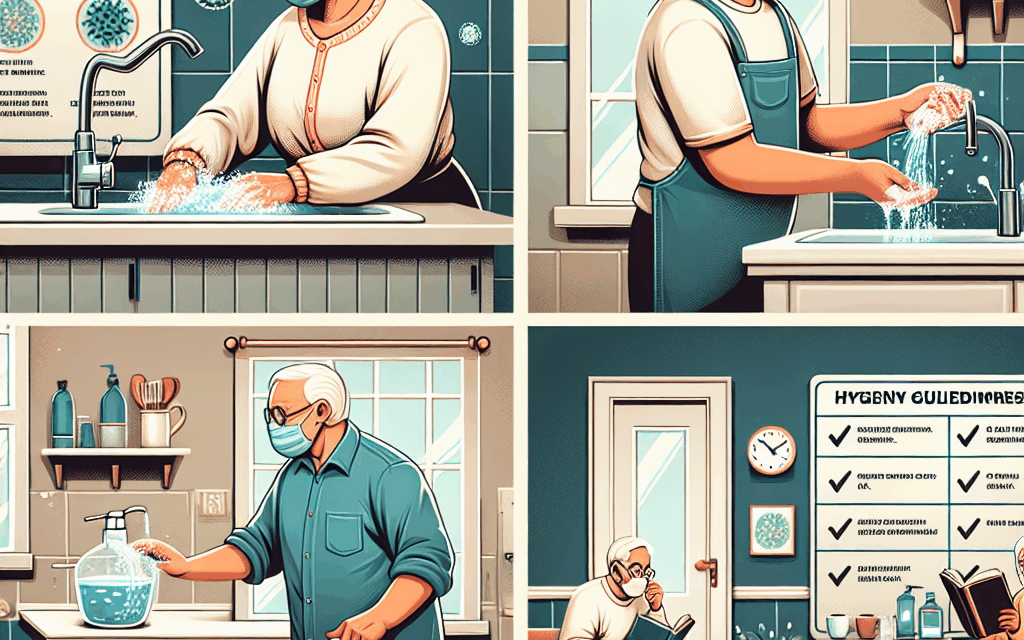Preventing Infections at Home: A Guide for Seniors
As we age, our immune systems naturally weaken, making seniors more susceptible to infections. This vulnerability can lead to serious health complications, especially for those with pre-existing conditions. However, many infections can be prevented with simple, proactive measures taken at home. This guide aims to provide seniors and their caregivers with comprehensive strategies to minimize the risk of infections, ensuring a healthier and safer living environment.
Understanding the Risks: Common Infections Among Seniors
Before delving into prevention strategies, it is essential to understand the types of infections that commonly affect seniors. These infections can range from mild to severe and can significantly impact quality of life.
- Respiratory Infections: Pneumonia and influenza are prevalent among older adults. The Centers for Disease Control and Prevention (CDC) reports that adults aged 65 and older are at a higher risk of complications from these infections.
- Urinary Tract Infections (UTIs): UTIs are common in seniors, particularly women. Symptoms may be less pronounced in older adults, leading to delayed treatment.
- Skin Infections: Seniors often experience skin changes that can lead to infections, such as pressure ulcers or cellulitis.
- Gastrointestinal Infections: Foodborne illnesses can be particularly dangerous for seniors, as they may lead to dehydration and other complications.
- Sepsis: This life-threatening condition can arise from infections and is more common in older adults due to weakened immune responses.
Understanding these risks is the first step in implementing effective prevention strategies. By recognizing the types of infections that pose a threat, seniors can take targeted actions to protect themselves.
Hygiene Practices: The First Line of Defense
Good hygiene is crucial in preventing infections. Simple practices can significantly reduce the risk of illness. Here are some essential hygiene practices that seniors should adopt:
- Handwashing: Regular handwashing with soap and water for at least 20 seconds is one of the most effective ways to prevent infections. Seniors should wash their hands before eating, after using the restroom, and after being in public places.
- Use of Hand Sanitizers: When soap and water are not available, using an alcohol-based hand sanitizer can be an effective alternative. Ensure that the sanitizer contains at least 60% alcohol.
- Personal Items: Avoid sharing personal items such as towels, razors, and utensils, as these can harbor germs.
- Respiratory Hygiene: Seniors should cover their mouths and noses with a tissue or their elbow when coughing or sneezing. Dispose of tissues immediately and wash hands afterward.
- Regular Cleaning: Frequently touched surfaces, such as doorknobs, light switches, and remote controls, should be cleaned regularly with disinfectant wipes or sprays.
Implementing these hygiene practices can create a safer home environment. For instance, a study published in the American Journal of Infection Control found that regular handwashing reduced the incidence of respiratory infections by 16% among older adults.
Nutrition and Hydration: Building a Strong Immune System
A well-balanced diet and proper hydration are vital for maintaining a robust immune system. Seniors should focus on nutrient-rich foods that support overall health and help prevent infections.
- Fruits and Vegetables: These are rich in vitamins, minerals, and antioxidants. Foods high in vitamin C, such as oranges and strawberries, can boost immune function. Leafy greens like spinach and kale provide essential nutrients that support overall health.
- Protein Sources: Adequate protein intake is crucial for immune health. Seniors should include lean meats, fish, eggs, beans, and legumes in their diets.
- Whole Grains: Foods like brown rice, quinoa, and whole-grain bread provide fiber and essential nutrients that support digestive health.
- Healthy Fats: Incorporating sources of healthy fats, such as avocados, nuts, and olive oil, can help reduce inflammation and support immune function.
- Hydration: Staying hydrated is essential for overall health. Seniors should aim to drink at least 8 cups of water daily, adjusting for activity level and climate.
Research indicates that proper nutrition can enhance immune response. A study published in the Journal of Nutrition found that older adults who consumed a diet rich in fruits and vegetables had a lower incidence of infections compared to those with less nutritious diets.
Vaccinations: A Key Component of Infection Prevention
Vaccinations play a critical role in preventing infections among seniors. Staying up-to-date with recommended vaccines can significantly reduce the risk of serious illnesses.
- Flu Vaccine: The CDC recommends that seniors receive an annual flu vaccine. The flu can lead to severe complications, including hospitalization and death.
- Pneumococcal Vaccine: This vaccine protects against pneumonia and other serious infections caused by pneumococcal bacteria. Seniors should discuss with their healthcare provider about receiving this vaccine.
- Shingles Vaccine: Shingles can cause painful rashes and complications. The CDC recommends the shingles vaccine for adults aged 50 and older.
- Tetanus, Diphtheria, and Pertussis (Tdap) Vaccine: Seniors should receive a Tdap booster every 10 years to protect against these diseases.
- COVID-19 Vaccine: Given the ongoing pandemic, seniors should stay informed about COVID-19 vaccinations and boosters to protect themselves from severe illness.
Vaccination not only protects the individual but also contributes to community immunity. A study published in the Journal of the American Geriatrics Society found that vaccination rates among seniors significantly reduced hospitalizations due to influenza and pneumonia.
Creating a Safe Home Environment: Reducing Hazards
In addition to hygiene and nutrition, creating a safe home environment is crucial for preventing infections. Seniors should take steps to minimize hazards that could lead to injuries or infections.
- Fall Prevention: Falls can lead to serious injuries, including fractures that may become infected. Seniors should remove tripping hazards, use non-slip mats, and ensure adequate lighting throughout the home.
- Bathroom Safety: Installing grab bars in the shower and near the toilet can help prevent falls. Seniors should also consider using a shower chair to reduce the risk of slipping.
- Kitchen Safety: Keeping the kitchen clean and organized can prevent foodborne illnesses. Seniors should ensure that food is stored properly and that surfaces are sanitized regularly.
- Air Quality: Poor air quality can exacerbate respiratory issues. Seniors should ensure proper ventilation in their homes and consider using air purifiers to reduce allergens and pollutants.
- Regular Health Check-ups: Regular visits to healthcare providers can help identify potential health issues before they become serious. Seniors should keep track of their medical appointments and follow up on any recommended screenings.
Creating a safe home environment not only reduces the risk of infections but also enhances overall well-being. A study published in the Journal of Safety Research found that home modifications significantly reduced fall-related injuries among seniors.
Conclusion: Empowering Seniors to Stay Healthy
Preventing infections at home is a multifaceted approach that involves good hygiene practices, proper nutrition, vaccinations, and creating a safe living environment. By understanding the risks and implementing these strategies, seniors can significantly reduce their susceptibility to infections and improve their overall quality of life.
Key takeaways from this guide include:
- Understanding common infections that affect seniors is crucial for prevention.
- Good hygiene practices, such as regular handwashing, are the first line of defense against infections.
- A balanced diet and proper hydration are essential for maintaining a strong immune system.
- Staying up-to-date with vaccinations can prevent serious illnesses.
- Creating a safe home environment reduces hazards that could lead to injuries or infections.
By taking proactive steps, seniors can empower themselves to lead healthier lives, minimizing the risk of infections and enjoying their golden years to the fullest.





